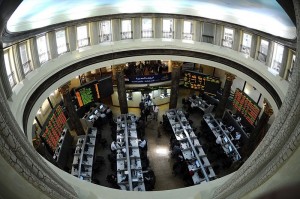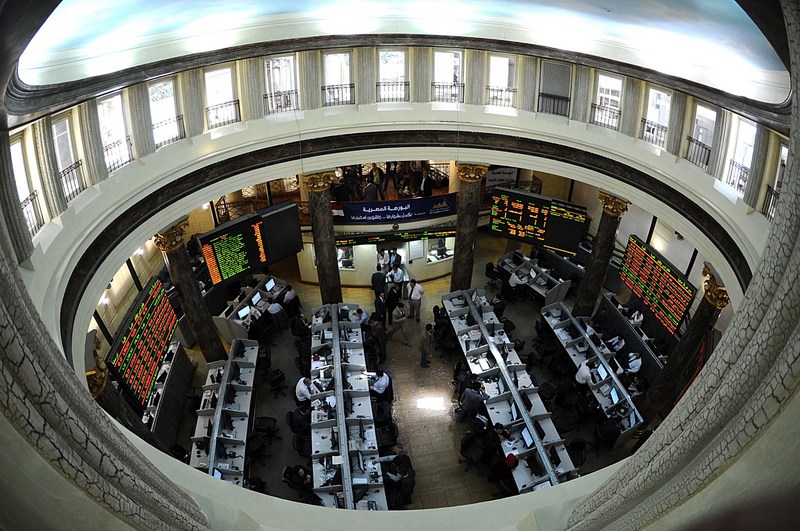
(Photo by Mohamed Omar)
By Mahmud Al-Qasas
A surge of optimism has swept over Egypt’s stock exchange, prompting a surge in share-prices after an almost seven-month slump since the end of 2012, brought about by intense political instability and polarisation seen throughout the country.
Conflict between supporters and opponents of former president Mohamed Morsi, in addition to repeated credit downgrades witnessed since the outbreak of the January 25th Revolution, have all contributed in one way or another to the flight of domestic, foreign and Arab investors from Egypt’s stock market.
This process began to reverse itself last Thursday after a new sense of optimism swept the market with regards to the country’s future economic prospects.
Muhammad Abid, chairman of the EFG Hermes’ brokerage department, stated last Thursday that the company contacted a number of former clients who had left the Egyptian market beginning in January 2011, informing them of the upward curve expected to take place on the country’s stock exchange over the long term.
He added that foreign investors in particular were seeking to take advantage of the sense of optimism seen throughout Egypt in order to re-enter the country’s stock exchange and begin buying shares. Expectations that a national unity government might soon be formed, which could bring together all sides of the Egyptian political spectrum, helped fuel the optimism of investors who hope that such a scenario could bring about the stability needed to foster growth.
Despite the fact that the market has recently achieved upwards of EGP 500m worth of trading, Abid noted that such numbers are still weak and lower than what has been expected. He attributed this to the closing of shares at their maximum rising rates, a result of the lack of offers being made for most shares. These indicators are expected to increase and double during sessions held throughout the next week.
Abid said that new money being pumped into the market would continue until the outbreak of new strikes or political conflicts that could threaten the performance of the market over the short term. He further pointed out that any such decrease in market indicators could be exploited by investors as an opportunity to buy cheap stock.
Wail Anba, Chairman of the Board of Directors for the Al-Awa’il security portfolio management company, stated that the large number of demands and requests made by clients in previous years is what eventually led to their cutting off of relations with the Egyptian stock exchange. Recent upsurges in buying seen over the last week are the first seen in years, he said.
Anba attributed recent improvements in the market to four primary causes. The first of these is that many worldwide stock exchanges, primarily those in Japan, the US and Turkey, had recently begun to overcome the world economic recession and achieve high rates of growths. Egypt on the other hand, had seen its stock prices plummet to their lowest levels in eight years, making their purchase seem attractive to investors.
He pointed to Egypt’s improved relations with European countries and neighboring Arab states, whether directly or indirectly, as the second cause behind recent stock surges. Improvement in such relations, he said, could lead to an increase in Egypt’s foreign currency reserves, in addition to an increase in the distribution of petroleum products and essential goods to Egyptian citizens, which could help relieve pressure on the Egyptian pound.
The third cause, he said, was the Ministry of Interior’s initial stabilisation of the country’s security situation immediately following the 30 June protests, a fact which could help pave the way for increased rates of tourism and investment in the eyes of investors.
Anba concluded that the fourth cause is the the belief held by many that international rating agencies would now begin to view Egypt as a stable investment option, thereby improving the country’s reputation worldwide.
Translated from Al-Borsa


